Behind the Lens: A Conversation with Native Filmmaker Petyr Xyst
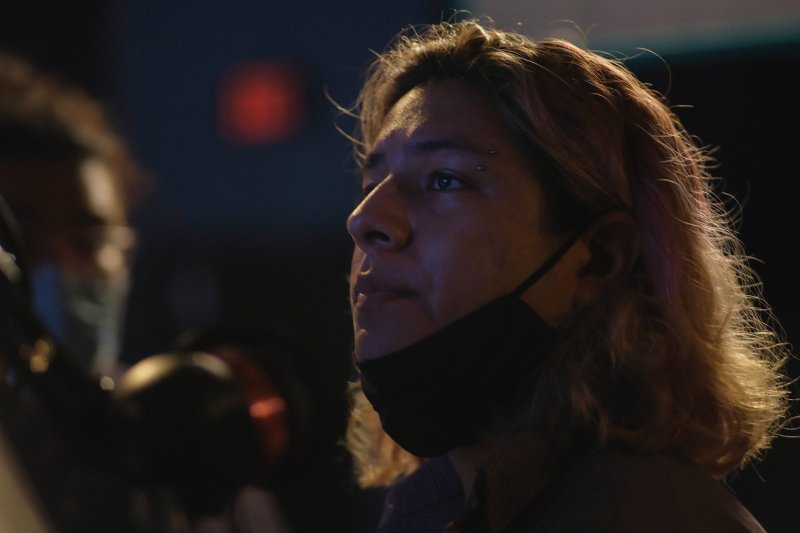
Petyr Xyst looks intently at a camera monitor on the set of The Original Shareholder Experience. Photo courtesy of D. Radoff
Petyr Xyst (Laguna Pueblo) traces his roots of being a filmmaker to the age of five. “The most obvious influence on me was seeing Star Wars as a really young kid and being completely taken by its scale and by the ability of film to transport the mind galaxies away with total believability,” he remembered. Xyst would often steal his parents’ MiniDV camcorder and record footage at playdates, school, and even Boys and Girls club convenings after school. “It began as recreating scenes from Star Wars, and then went into LEGO stop motion, and then to juvenile nuclear war shorts, and over time I learned to synthesize how certain movies made me feel into stories that employed my own life experience,” said Xyst.
In 2022, Xyst received a BFA in film from the University of New Mexico and was a finalist for NBC Universal’s New Mexico Directors Initiative. Xyst screened his short film The Original Shareholder Experience in 2022 at the NEA-supported 15th National Film Festival for Talented Youth (NFFTY). As the largest youth film festival in the world, NFFTY is dedicated to empowering and connecting young filmmakers (ages 24 and under), aiming to dismantle inequities within the film and television industry. Founded to combat discrimination against emerging talents, NFFTY champions and amplifies the voices of people from marginalized communities, ensuring diverse perspectives are recognized and provided a platform.
We spoke with Xyst about his approach to storytelling, the creative process for The Original Shareholder Experience, and his advice to new and seasoned filmmakers.
NEA: What drew you to the world of writing, directing, and editing?
PETYR XYST: I was a really shy kid, so I would often stay home while others hung out at trendy cafes or partied. I would often work until sunrise cutting and recutting scenes from movies or shows I liked, developing narratives out of free stock footage, whatever I could get my hands on. I come to writing and directing mostly from an editing perspective—how do I want this to cut, what will be the temporal effect—so in a way all of prep and all of photography is just gathering assets so I can make the most dynamic cut possible. The actual work of filmmaking is what I’m most attracted to, even more so than watching movies themselves, which I absolutely adore. But the ability to externalize an abstraction in your head, a feeling, a concept, and make it real in some way, is what I love. The ability to guide an audience’s eyes, emotions, and thoughts into areas they may not usually venture into is really captivating.
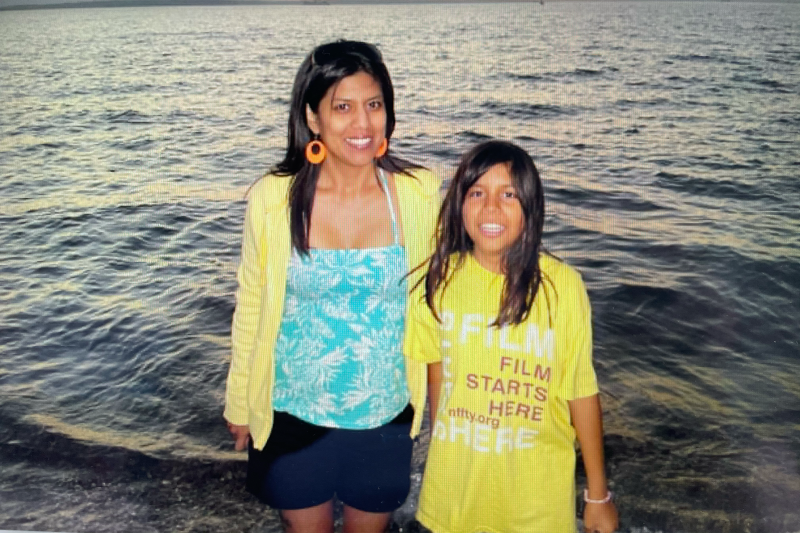
Janel Riley (left) and a young Petyr Xyst (right) pose for a photo in front of the Puget Sound, as Xyst wears an overlarge NFFTY t-shirt. Photo courtesy of Petyr Xyst
NEA: What challenges have you faced as a young filmmaker?
XYST: I’ve been really lucky to have extremely supportive parents and have over time built a community of friends who are also interested in filmmaking. My relationship with Sundance has guided me through the weirdness of the formalized film industry. For a long time, really until I made my last short, people outside of those circles didn’t take me seriously. Most people don’t take young filmmakers, young people in general, seriously. At 23 and with a for-real bachelor’s degree, I still don’t really feel like a full person. I’m still in the age of dismissal unless I read off a list of my credentials and awards and various markers of having made something of myself.
NEA: Do your visions for films and scripts arrive through dreams, everyday life, or other inspirations?
XYST: I’m really bad at remembering my dreams so if anything comes from that, it’s entirely subconscious. A lot of my stories come from iteration after iteration of a really bland idea that, after going through the wringer, shakes out to be relatively original. The way I used to approach things I wanted to make was through specific concepts in films I had just seen, or themes that I couldn’t let go of. Music is really important to my writing, and it’s how I articulate how I want a certain beat or project to emotionally resonate—sometimes I’ll just put an album on or build a playlist and sit back and imagine scenes. I’ll walk a lot with music on and imagine how I would shoot a certain thing to fit the feel of the song.
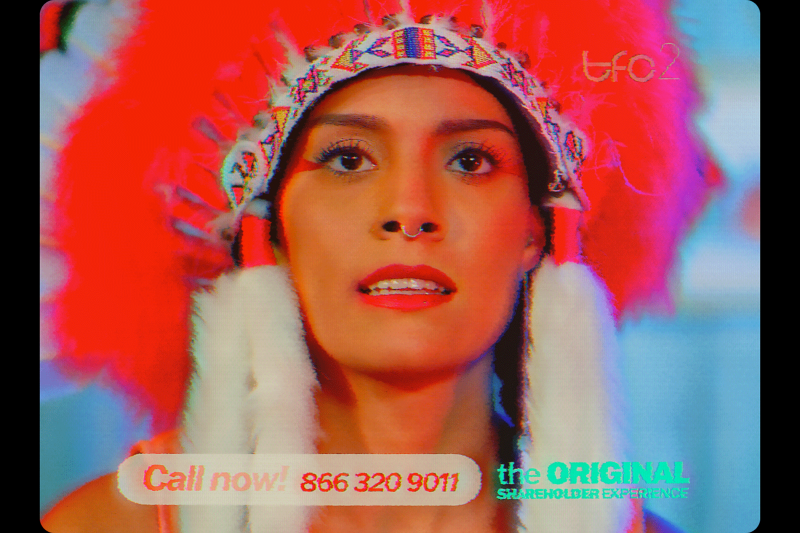
Rebecca (actress Briana Gonzalez) in a war bonnet looks through the lens of a distorted television camera. Photo courtesy of Petyr Xyst
NEA: Could you explain the creative process of The Original Shareholder Experience?
XYST: It began as me wanting to rip off Robin Comisar’s short Great Choice, which I saw at SIFF [Seattle International Film Festival] when I was a senior in high school. Thematically, the film came from my experiences of being shown glimpses of the film industry and my sense that a lot of these corporate decision-makers weren’t as much interested in Indigenous people’s stories on their own merits as much as they saw the capitalist incentive of a new market to be exploited. There was a lot of paranoia that came from that and a very real crisis of whether this was the avenue I was still interested in going down. It was written in late 2019 and early 2020, but was rewritten dramatically as it went through Sundance’s Native Lab amid the George Floyd uprisings, which I participated in nearly daily during my summer break in Seattle [, Washington]. It then was revised and readied in time to shoot in summer 2021.
We shot it in the University of New Mexico facilities as well as the Indian Pueblo Cultural Center, which felt fitting, with a crew mostly composed of friends and friends of friends. It was a really Native set and I’m very proud of that. We actually cast Briana Gonzalez [actress who played the lead role of Rebecca] probably two or three weeks before shooting which would have been its own nightmare, but she was also auditioning from Chicago [, Illinois]. We tried to cast as local as possible and succeeded everywhere else, but after auditioning tons of people for Rebecca, I was still unsatisfied with who we had seen. Briana kind of saved the film’s life there.
NEA: The lead actress plays two roles over the course of the film. Why have the same person play both of those roles?
XYST: I wanted to create a juxtaposition between the vanity of live television and the vanity of those in power throwing off decisions that affect entire communities and histories with such negligence— it’s evil, but it’s not even done with enough self-awareness to be called malice. Being in the room and not standing up for what you believe in is still acting as a participant in evil. I wanted the television sequences to communicate a gilded nature to the concept of paternal progressiveness from the oppressor’s eye because people are much more frank and technical about who they are when the lights are off and the doors are shut. Beyond that, you’ll have to come to your own conclusions.
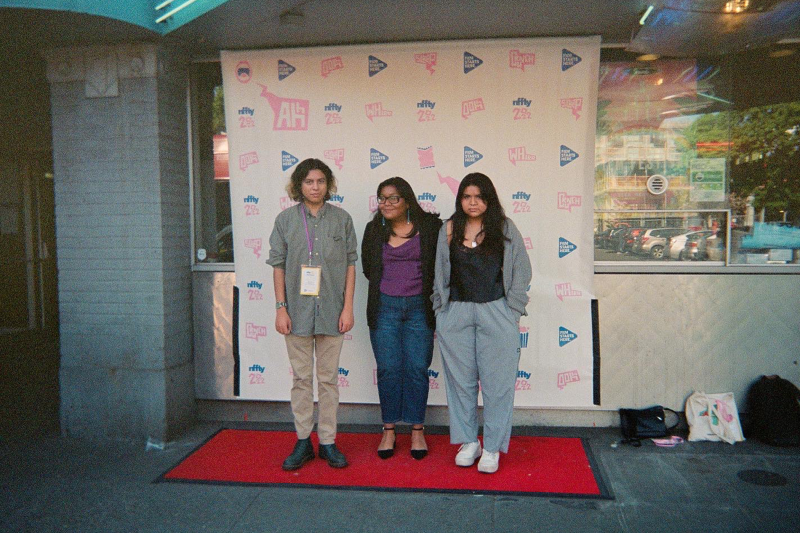
Petyr Xyst (left), Autumn Billie (center), and Lauren Begay (right) stand in front of a small NFFTY step-and-repeat. Photo courtesy of Petyr Xyst
NEA: What have you gained from participating in NFFTY?
XYST: NFFTY has been one of the most formative resources in my filmmaking life and I would absolutely not be where I am today without them, full stop. I’ve been going to NFFTY basically since it began; my dad took me to a screening they did in 2007 or 2008, and I fell in love so unbelievably hard seeing these movies on the big screen that were made by people in my age range, and which didn’t pander to me. I’ve gone every year I possibly can since then, with my dad, my mom, and my friends, and made it a centerpiece of the filmmaking program me and my friend Anders Bloom created in high school.
I’ve been to a fair amount of festivals over the past few years, and NFFTY is still the top one for me. There’s something so uniquely satisfying about being blown away by the stories screened every year and then being able to talk to the people who made them like they’re your friends—in many instances, they have become my friends. They’ve become my collaborators.
NEA: What projects are next for you?
XYST: My friend Max and I are honing in on writing a high school neo-noir feature set in Seattle, Washington. I don’t want to discuss it [fully] because it’s still in the infant stages, but we’re hoping to get it made on a shoestring budget in the next few years. Where I can fit in the time outside of my job, I’m also trying to break into music videos and writing more shorts.
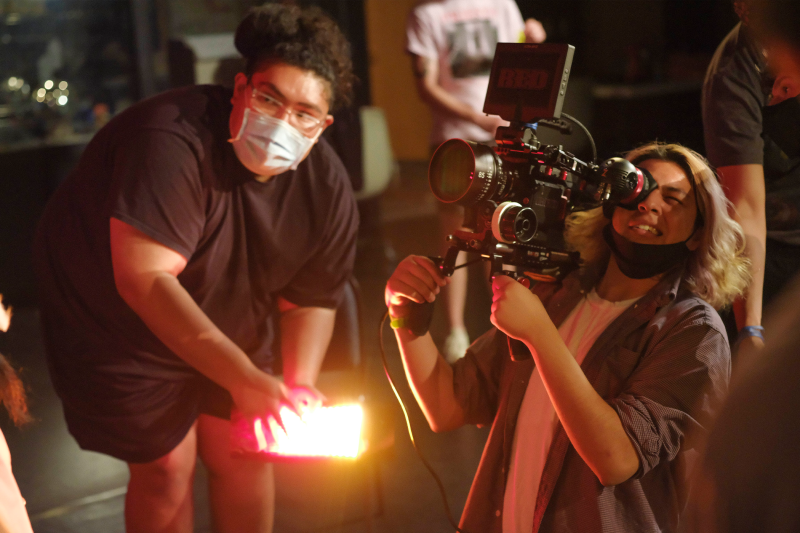
Kymon Greyhorse (left) hollywoods an LED light as Petyr Xyst (right) mans a camera to get a close-up while other crew members stand ready. Photo courtesy of D. Radoff
NEA: What advice would you give to aspiring filmmakers?
XYST: When I was 13 years old, my friend and I attended a screening of Edgar Wright’s Cornetto Trilogy [Three Flavours Cornetto] at the SIFF [Cinema] Uptown. It was one of the most influential days in my life because I also asked Edgar this exact question. I put it on YouTube and refuse to take it down because, for as horrifying as my pubescent voice sounded, he answered very simply: “Be persistent and be tenacious.” It’s deceivingly simple advice, but advice I’ve had to remind myself on an almost monthly basis as I fall into my deep dark crises about not being where I want to be and wondering if I’m anything beyond my filmmaking ability, and if my filmmaking ability is any good in the first place. But then I rewatch that video and my partner tells me to get a grip.
One year I was at NFFTY and I heard this wisdom that sticks with me to this day: “Don’t call yourself an aspiring filmmaker— you’re a filmmaker if you want to be.” Be tenacious.




